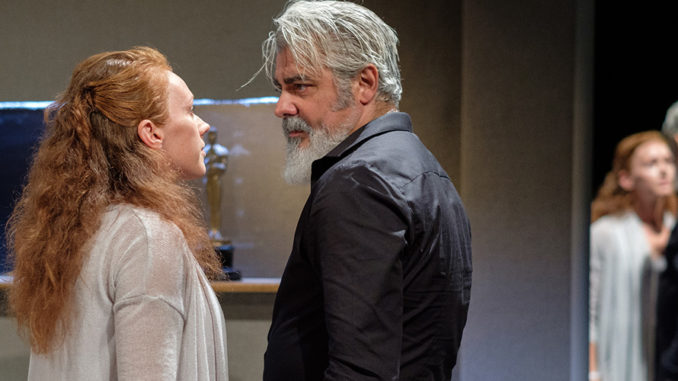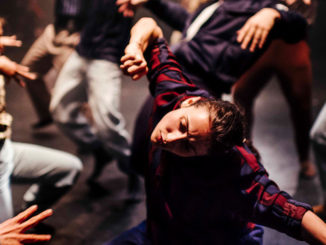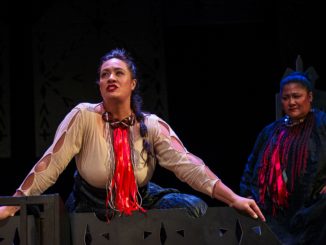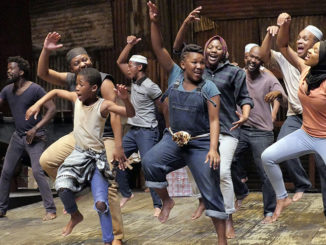
[Unvarnished Insight into Sanctimony]
Walking into the ASB Waterfront Theatre to a packed audience, I reflect on the title of this piece – an apparent crossover between two geographies – betraying little about a story or the direction that it could go in. The stage has an elevated square performance area furnished like a posh living room, with a comfortable-looking sofa and an ottoman-like stool. A glass wall and a piece of modern art amplify the sense of looking into a bourgeois living space. We begin with a brief message reaching out to the people of Aotearoa in our time of grief following the terrorist attack in Ōtautahi. The message is heartfelt, delivered by one of the actors, and is appreciated by nods of approval in the audience. Shortly thereafter, two men dressed in casual formal dress take to the stage, and begin to speak.
We are thrust into the middle of a conversation about why women should be speaking out in Hollywood. A white-bearded American man in jeans and a black open-collared shirt is leading this discussion, as a more outwardly reserved Englishman in a grey waistcoat listens with a glass of red wine in hand. Chuckles ring out in the audience as the two men prescribe how women should speak out, repeatedly glossing over the irony of their contributions to the ‘cause’ against the backdrop of the very men they other and banish from respectability by judging them on their actions as the conversation goes on. The audience senses something amiss as the alcohol flows and the reserved English theatre owner visibly progresses to boldness in the face of the outspoken actor.
We are told that Jay, the American actor, is in London, England, to perform the lead role in a play written by Ruth, an Irish playwright. The Englishman, Leigh, is the owner of the theatre where the play will debut, and is clearly confident in a comfort zone of ‘wokeness’ seen so often among creatives in social settings. Initially, it is Jay’s selective ignorance that frightens me; as I appreciate the razor-sharp wit of David Ireland’s script, my instinct to focus my musings on a single character’s flaws is quickly proved to be mistaken. Leigh’s willingness to rise to misogynistic barbs is revealed only after alcohol flows and formalities are shed in the course of events. The entry of a female character gives us pause – we ponder how she will cope with the tone set by these utterly infuriating men.
Ruth is the only character who is wearing light colours when she bursts onto the set, apologising profusely for her tardiness. Conversely, she comes across as unapologetic to the audience immediately after explaining that her mother was hospitalised and that her sister was sitting with her at this difficult time. I find myself intrigued at this subplot, which is never satisfactorily explained anywhere in the rest of the performance. With all characters on stage, the scene leans into navigating the intersection points between identity and gender politics as more alcohol is passed around. Intense rounds of networking are quickly set aside as sanctimony takes centre-stage, appropriated along gendered realities claimed by each character in turn. The writing allows for each character to speak their truth in an unhurried way, with the other two actors revealing the build-up of tension with non-verbal communication on their faces as the audience reels from the outrageous clash of egos.
Robert Jack’s portrayal of Leigh is an extraordinary study in the many characters that follow in moments of peer pressure, revealing toxicity in expressing masculinity under the slightest application of pressure. His softer approach to his own misogyny is balanced by the stalwartly unapologetic portrayal of Ruth by Lucianne McEvoy, who brings a much-needed reality-check for the two men she is obliged to confront during the social event she’s left an ailing mother behind for. Darrell D’Silva’s take on Jay provides a comic outlet for the audience to settle into, punctuating his interpretation with moments of shock and awe to keep us guessing. The cast elevate the writing into a palpable storm, knocking the wind out of us as they wield moral superiority over each other to try and top themselves in an unvarnished but human display of day-to-day adult behaviour. This encourages us to introspect without condescending to us – no mean feat for a show about a drunk conversation between three white people, two of whom massage each other’s egos.
Ulster American then presents a captivating snapshot of what might happen when we feel like we are cognizant of the impact of misogyny on those receiving it, but nonetheless remain shackled to conform to our own comfort zone for the sole reason of wielding power over women. The play eviscerates the notion that speaking about being ‘woke’ is adequate when your decision-making impacts societal conversations around resentment in the divisions created by identifying oneself as different to the categories that men who sit at the top of the hierarchy place us in. By the time that the players take a bow, I muse over how my own actions have shaped and misshaped the realities that women around me have little choice but to experience. The latter is particularly important given that Ruth is backed into a corner and given little choice but to resort to blackmail in the last third of the plot.
I do however emerge from the theatre unimpressed by the ending, which feels like a dissatisfaction – a let-down of a climax that feels off-putting on reflection. I struggle to reconcile myself to the notion that violence is an answer to revelations of misogynistic behaviour. I was puzzled as to why the confined space of the living room seemed to add credence to the belief that a tweet cannot be rewritten on another device, and that a single phone was the sole manner in which extortionary blackmail could be conducted on that stormy evening in London. Regardless, the ending itself does not detract from the rewarding experience of the production as a whole.
Gareth Nicholls’ direction is steady and unflinchingly effective throughout the play, blending together the feeling of being detached from the uprisings against insularity and embitterment and the feeling of actively contributing to everyday episodes of nonconformity from places separated along gendered lines. This is bolstered in no small part by a stellar script by the writer, and the smooth operation of a busy stage by Kevin McCallum, Gemma Turner and Gary Staerck. The choreography of the fight scene is a valiant effort by Emma Claire BrightLyn, translating into a competent scene for three characters dulled by alcohol consumption. Kate Bonney’s stage lighting is a superbly consummate addition to the mood in the theatre, highlighting all of the tonal contrasts on Becky Minto’s well-organised set and Sophie Ferguson’s sublime costuming.
Retracing my feelings from beginning to end, I am pleasantly surprised to have been willing to engage with the endeavour to expose hypocrisy throughout. Seldom do we find the courage to confront hypocrisy in word and action as we go about our daily lives, and theatre is an expressive medium to face up to the underbellies of the convictions we hold to. Ulster American has certainly succeeded in placing the feeling of being unnerved at the forefront of our minds. I am keen to see more work by the Traverse Theatre Company taken to our shores in the future, given their commitment to new writing and the championing of contemporary theatre as the heart of cultural life.
Ultster American plays ASB Waterfront Theatre until 24 March.




Leave a Reply